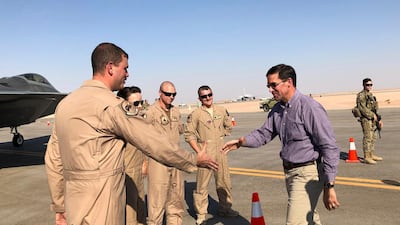US President Donald Trump has informed Congress that the first group of American troops have been sent to Saudi Arabia to deter Iran’s threat, with the rest of the 3,000 soldiers to arrive within weeks.
Mr Trump announced the troop movement in letters sent to the House of Representatives and the Senate on Tuesday.
The troops will stay there for as long as they are able to deter Iranian threats, he said.
The news was in response to pre-dawn attacks on two major Saudi oil facilities on September 14, which temporarily took out 5 per cent of the global oil supply.
Iran has been implicated in the attacks, US officials said, and Saudi Arabia is still conducting an investigation.
Mr Trump referred to the attacks in his letter and said the goal was "to protect United States interests and enhance force protection in the region against hostile action by Iran and its proxy forces".
He said the move was intended to reassure the US's international partners, deter further Iranian provocation and bolster regional defence.
The deployment includes radar and missile systems, an expeditionary wing to support the operation of US fighters from the kingdom, and two fighter squadrons.
The troops will most likely be stationed at the newly reopened Prince Sultan Air Base, more than a decade and a half after American troops left it.
The base was first used by US in 1990 during the liberation of Kuwait but it left in 2003 after the invasion of Iraq.
Ryan Bohl, a Mena analyst at US intelligence firm Stratfor, said the letter was “a defensive move by the US designed to deter further Iranian attacks and position forces for, if necessary, limited retaliation".
"It will create a set of targets the Iranians cannot strike without getting the American deployments involved," Mr Bohl told The National.
And while 3000 troops may seem large compared to the 1,000 US troops in Syria, Mr Bohl said: “It's still too small to cover the whole kingdom.”
But he did not anticipate that the US would increase the number.
“At the moment this is likely to remain limited, especially in an election year and especially with the impeachment investigation at home,” Mr Bohl said.
Last week the new Saudi Foreign Minister, Prince Faisal bin Farhan, visited the US and met Secretary of State Mike Pompeo.
Sheikh Abdullah bin Zayed, the UAE Minister of Foreign Affairs and International Co-operation, arrived in Washington on Tuesday.
Sheikh Abdullah will be discussing Gulf security and bilateral relations with Mr Pompeo, National Security Adviser Robert O’Brien, and other US senior officials this week.


